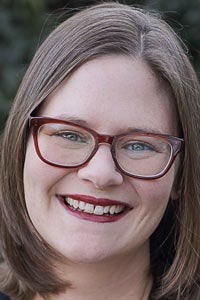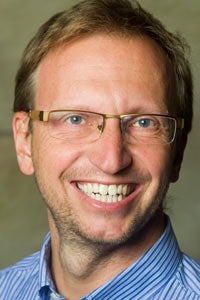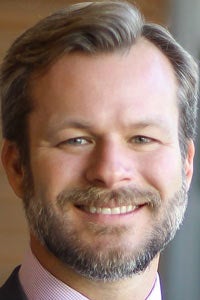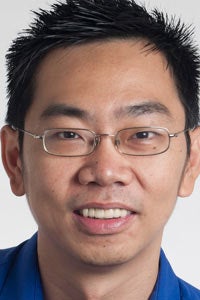Twelve early-career faculty members are adding a new title after their names: Chancellor’s Fellow, in recognition of their outstanding work in academia. Each keeps the title for five years and receives $25,000 in philanthropic support for research or other scholarly work.
Chancellor Gary S. May congratulated the fellows: “Your achievements are impressive and inspiring. I know that with this recognition, you’ll continue to contribute in significant ways to your research and teaching.”
Here are the 2020-21 Chancellor’s Fellows, all but one of them with the rank of associate professor, listed with their department or school in parentheses: Eliza Bliss-Moreau (psychology), Lark Coffey (veterinary medicine), Davide Donadio (chemistry), Kevin Gee (education), Mark Huising (neurology, physiology and behavior), Michael Miller (animal science), Eva Mroczek (religious studies), Stephanie Mudge (sociology), Branwen Okpako (cinema and digital media), Brian Soucek (law), Cheemeng Tan (biomedical engineering) and Anne Visser (community and regional development).
They bring to 166 the total number of Chancellor’s Fellows who have been named in the program’s 21-year history, with funding from the UC Davis Annual Fund, Davis Chancellor’s Club and UC Davis Parents Fund.
“We are also thankful for our donors, who recognize the excellence of our early career faculty and provide the kind of support that allows them to flourish,” Chancellor May said.
Shaun Keister, vice chancellor of Development and Alumni Relations, said Chancellor’s Fellows awards are particularly noteworthy because the funding is unrestricted. “It gives our faculty members the flexibility to take their work in new and exciting directions,” he said.
“When you combine high-caliber faculty and a supportive community, you get the top research university that we are.”
More about the 2020-2021 Chancellor’s Fellows (click anywhere in each box, to see the fellow’s faculty page):

Eliza Bliss-Moreau
Associate professor, Department of Psychology, College of Letters and Science
Bliss-Moreau has pioneered cross-disciplinary studies of affect — the foundation of emotions — in both humans and nonhuman primates. She uses multiple methods from lab experiments in neuroscience and psychology to fieldwork to investigate the development of affect across lifespan as well as how environmental factors, such as social context, influence affect. Bliss-Moreau also has a research program investigating neurodevelopmental diseases, including fetal Zika virus infection and Alzheimer’s disease.
“Her work at the intersection of human psychology and primate research is — frankly — incredible. The way in which she is taking assumptions we affective psychologists make about the origins and basicness of human emotion and personality and testing them directly with innovative and rigorous methods is unprecedented.” — Dana R. Carney, associate professor, Hass School of Business, and director, Institute for Personality and Social Research, UC Berkeley

Lark Coffey
Associate professor, Department of Pathology, Microbiology and Immunology, School of Veterinary Medicine
As a virologist, Coffey’s research focuses on mosquito-borne viruses and understanding how viral genetic changes affect the potential for human disease outbreak. Her work with the UC Davis’ California National Primate Center has led to the development of animal models to investigate Zika effects on fetal development and therapies to avert Zika congenital syndrome. She also led a study demonstrating the potential for backyard species of California mosquitoes to transmit Zika virus.
“I believe Dr. Coffey ranks among the top mid-career faculty at UC Davis due to her responsiveness to the public health issues of our time and the unique societal and scientific impacts of her research.” — Christopher Barker, associate professor, Department of Pathology, Microbiology and Immunology

Davide Donadio
Associate professor, Department of Chemistry, College of Letters and Science
Donadio is a theorist who uses modeling to investigate materials properties and chemical reactions across multiple scales of size and time. He uses approaches such as molecular simulations and machine learning to study problems such as heat transfer in materials, reactions at surfaces and in solutions, crystal growth and the chemistry of the surface of ice crystals.
“In my view, Davide Donadio is a star: He has already achieved international visibility but I have no doubt his star will continue to rise.” — Daan Frenkel, professor, University of Cambridge

Kevin Gee
Associate professor, School of Education
His research into the complex relationships between health and education — particularly in regard to underserved youth — is thorough, interdisciplinary and highly impactful, influencing California policy and receiving mainstream media coverage. His scholarship has also earned him competitive awards such as the National Academy of Education Spencer Postdoctoral Fellowship and the Foundation for Child Development Young Scholars Program Award. His excellence in research is mirrored in his teaching, evidenced by high praise he’s received from students and faculty alike.
“Professor Gee is an outstanding scholar and exceptional teacher. His research on the impact of educational policies and school practices is extremely relevant and timely and has advanced our understanding of education, health, and social outcomes for underserved youth.” — Lauren Lindstrom, dean, School of Education

Mark Huising
Associate professor, Department of Neurobiology, Physiology and Behavior, College of Biological Sciences
Huising’s research focuses on “crosstalk” between cells within pancreatic islets, which regulate blood sugar by producing insulin. He has made new discoveries about how the different types of cells within the islets regulate each other through the hormones urocortin and somatostatin. His research has also revealed a previously unknown class of cells in the islets called “virgin beta cells.” These discoveries are providing new insights into the development of diabetes and other diseases.
“He has established an exceptional research program with a much steeper trajectory than his peers at a similar stage of their careers, and he is an internationally recognized leader in the field of islet biology and diabetes.” — W. Martin Usrey, professor and chair, Department of Neurobiology, Physiology and Behavior

Michael Miller
Associate professor, Department of Animal Science, College of Agricultural and Environmental Sciences
Described as a “modern geneticist,” Miller applies cutting-edge sequencing and sophisticated methods to make exciting and impactful discoveries about fish biology and conservation. As an undergraduate, Miller pioneered a new technique called RAD sequencing that revolutionized how scientists study genetic variation. His research on Pacific salmonids continues to play a major role in efforts to craft effective conservation and management strategies for the fish. For example, his work has shown that the genetic variation underlying the spring migration phenotype in chinook salmon can be lost rapidly following dam construction in a river. The fish populations he studies have major historical and cultural significance for Native American cultures along the West Coast and for commercial fisheries.
“A ‘keystone species’ is a species on which other species in an ecosystem largely depend, such that if it were removed, the ecosystem would change drastically. I believe Dr. Miller is a ‘keystone faculty’ here at UC Davis.” — Bernie May, adjunct professor emeritus and founder of the Genomic Variation Laboratory, Department of Animal Science

Eva Mroczek
Associate professor, Department of Religious Studies, College of Letters and Science
Mroczek, director of the Jewish Studies Program, is a scholar of early Jewish literary and cultural history. Her first book, The Literary Imagination in Jewish Antiquity, illustrates how early Jewish writers imagined their own sacred writing before the Bible existed as a concept. It won the De Long Book History Prize from the Society for the History of Authorship, Reading and Publishing, and the Manfred Lautenschlaeger Prize for Theological Promise. Her current projects include “Out of the Cave: The Possibility of a New Scriptural Past,” an intellectual history of manuscript discovery stories, and a guide to imaginary books in ancient and medieval Jewish lore. She received the Frederick Burkhardt Residential Fellowship for Recently Tenured Scholars from the American Council of Learned Societies to support research for “Out of the Cave.”
“Professor Mroczek has been a vital addition to the Department of Religious Studies, expanding access, enrollments and the department’s research profile in the ancient religious world. The study of ancient texts often presents enormous challenges to productivity. Professor Mroczek has been very impressive both in terms of quantity and in terms of impact on her field.” — Ari Kelman, interim dean, College of Letters and Science

Stephanie Mudge
Associate professor, Department of Sociology, College of Letters and Science
Mudge is a historical, political and economic sociologist specializing in the theoretically driven analysis of Western politics, economies and economic expertise. Her award-winning book, Leftism Reinvented: Western Parties From Socialism to Neoliberalism, develops a centurylong comparative, historical and biographically sensitive analysis of the American Democrats, the German and Swedish Social Democrats, and the British Labour Party. She has also written on Bitcoin, European integration, the European Central Bank and the history of neoliberalism.
“A common thread running through her varied research projects is how and why Western political institutions, especially those on the left, work against democratic representation of disadvantaged people in mainstream politics.” — Ari Kelman, interim dean, College of Letters and Science

Branwen Okpako
Associate professor, Department of Cinema and Digital Media, College of Letters and Science
Okpako is a writer, director and editor of film who specializes in multiple genres: documentary, fiction and hybrid film as well as video art installation. Her work focuses on people of African descent both in continental Africa, especially Nigeria and Kenya, and in the African diaspora, especially in Germany. Her topics range from the entanglements of colonialism to globalization experienced at the level of the individual. In 2019 she received the Faculty Scholar Award: Center for the Advancement of Multicultural Perspectives on Social Science, Arts and Humanities, or CAMPSSAH. Her current projects include “Freedom” and “Zora and Fannie.”
“Her work ... is as astute and perspicacious as it is clearly communicated, generous and groundbreaking. In an area of scholarship in which there has long been too little support and attention, Professor Okpako is a shining light; her work is absolutely essential.” — Frieda Ekotto, professor of Afroamerican and African Studies, comparative literature and Francophone studies, University of Michigan

Brian Soucek
Professor, School of Law
He is a constitutional law professor with a Ph.D. in philosophy, whose teaching and scholarship center on the rights of marginalized communities. He has written for top law reviews and for the Washington Post and Los Angeles Times, on topics ranging from same-sex marriage to President Trump’s campus free-speech order to law and aesthetics. An amicus brief he co-wrote on behalf of leading anti-discrimination law scholars was cited in an opinion in the U.S. Supreme Court’s landmark 2020 ruling in favor of LGBTQ employment protections. He is a 2020-21 fellow of the UC National Center for Free Speech and Civic Engagement, working on a project titled “Institutional Values, Academic Freedom and the First Amendment.”
“Professor Soucek is a prolific and accomplished scholar and excellent constitutional law professor who is committed to service to the community.” — Kevin R. Johnson, dean, School of Law

Cheemeng Tan
Associate professor, Department of Biomedical Engineering, College of Engineering
Tan’s laboratory combines synthetic biology and materials science to create miniature “artificial cells” that mimic some properties of living cells while showing superior function in some areas. These artificial cells have broad applications in disease therapy, biosensing and the high-throughput study of biological processes. He also uses computational simulations to understand and design these artificial cells.
“Professor Cheemeng Tan has an outstanding record in performing interdisciplinary scientific research, especially in developing and applying synthetic biology, a field in which he is regarded as a young leader.” — Gang Bao, associate dean and professor of bioengineering, Rice University

Anne Visser
Associate professor, Community and Regional Development, Department of Human Ecology, College of Agricultural and Environmental Sciences
Her research focuses on economic development and socioeconomic inequality as they connect with policy and political systems. Her work includes research into the disparities in labor markets, immigration policy, and youth health and well-being. As a teacher and mentor, Visser has also designed special research positions for first generation students and students from underrepresented groups.
“Dr. Visser has made substantial contributions to scholarship, teaching and mentoring, and service and outreach that reflect a commitment to equity and justice.” — Helene Dillard, dean, College of Agricultural and Environmental Sciences
Media Resources
Dateline Staff, 530-752-6556, dateline@ucdavis.edu
